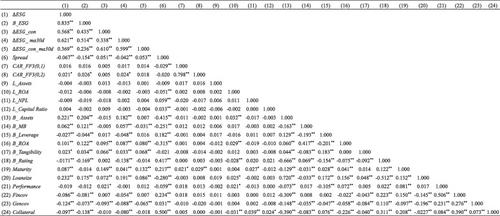当前位置:
X-MOL 学术
›
Journal of International Money and Finance
›
论文详情
Our official English website, www.x-mol.net, welcomes your feedback! (Note: you will need to create a separate account there.)
The ESG washing in banks: Evidence from the syndicated loan market
Journal of International Money and Finance ( IF 2.762 ) Pub Date : 2024-02-23 , DOI: 10.1016/j.jimonfin.2024.103043 Kuo-Jui Huang , Dien Giau Bui , Yuan-Teng Hsu , Chih-Yung Lin
Journal of International Money and Finance ( IF 2.762 ) Pub Date : 2024-02-23 , DOI: 10.1016/j.jimonfin.2024.103043 Kuo-Jui Huang , Dien Giau Bui , Yuan-Teng Hsu , Chih-Yung Lin

|
We investigate whether banks practice environmental, social, and governance (ESG) washing in their lending decisions and how the market reacts. That is, do banks with worse ESG performance intentionally lend to firms with better ESG performance to improve their ESG reputations? Banks with worse ESG performance offer significantly lower loan spreads, longer loan maturities, fewer general covenants, and fewer collaterals to firms with better ESG performance. More importantly, the stock market generally reacts favorably to banks that make these kinds of deals, which could explain why banks engage in ESG washing. We also find that the effects of ESG washing are significantly stronger for borrowers from high-polluting industries and in the post-Kyoto Protocol period. These results support the idea that the banks with worse ESG performance use ESG-washing lending to improve their ESG reputations.
中文翻译:

银行的 ESG 清洗:来自银团贷款市场的证据
我们调查银行是否在其贷款决策中实施环境、社会和治理(ESG)清洗以及市场的反应。也就是说,ESG表现较差的银行是否会故意向ESG表现较好的企业提供贷款,以提高其ESG声誉? ESG 表现较差的银行向 ESG 表现较好的公司提供显着更低的贷款利差、更长的贷款期限、更少的一般契约和更少的抵押品。更重要的是,股票市场通常对进行此类交易的银行反应良好,这可以解释银行为何进行 ESG 清洗。我们还发现,对于高污染行业和后《京都议定书》时期的借款人来说,ESG 清洗的效果明显更强。这些结果支持这样的观点:ESG 绩效较差的银行使用 ESG 清洗贷款来提高其 ESG 声誉。
更新日期:2024-02-23
中文翻译:

银行的 ESG 清洗:来自银团贷款市场的证据
我们调查银行是否在其贷款决策中实施环境、社会和治理(ESG)清洗以及市场的反应。也就是说,ESG表现较差的银行是否会故意向ESG表现较好的企业提供贷款,以提高其ESG声誉? ESG 表现较差的银行向 ESG 表现较好的公司提供显着更低的贷款利差、更长的贷款期限、更少的一般契约和更少的抵押品。更重要的是,股票市场通常对进行此类交易的银行反应良好,这可以解释银行为何进行 ESG 清洗。我们还发现,对于高污染行业和后《京都议定书》时期的借款人来说,ESG 清洗的效果明显更强。这些结果支持这样的观点:ESG 绩效较差的银行使用 ESG 清洗贷款来提高其 ESG 声誉。



























 京公网安备 11010802027423号
京公网安备 11010802027423号